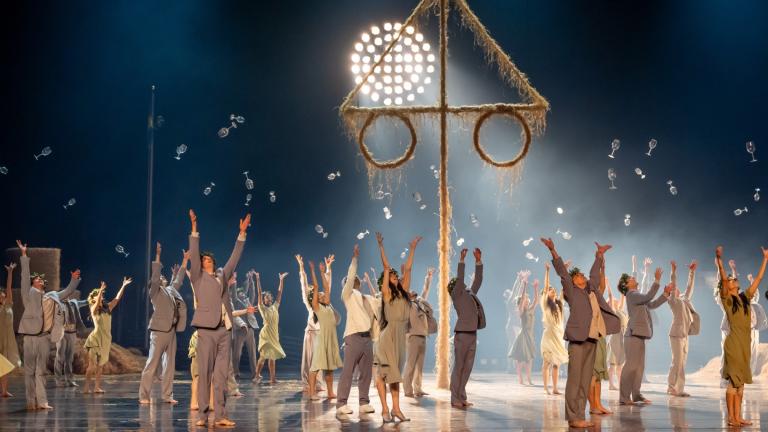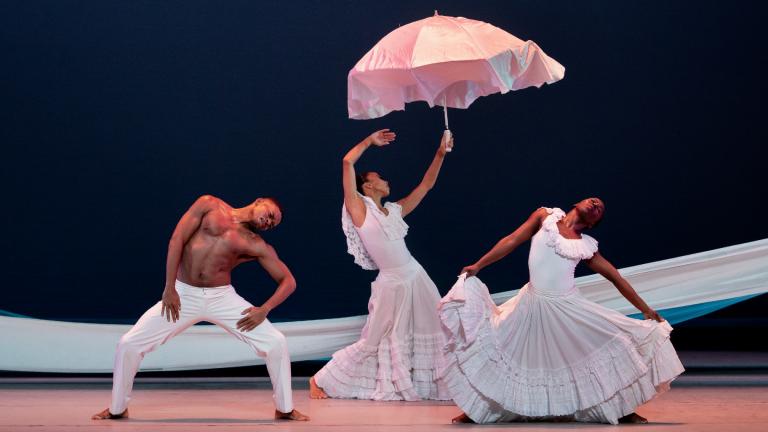 Sondra Radvanovsky and Craig Colclough in the Lyric Opera production of “Macbeth.” (Photo by Ken Howard)
Sondra Radvanovsky and Craig Colclough in the Lyric Opera production of “Macbeth.” (Photo by Ken Howard)
The Lyric Opera production of Giuseppe Verdi’s “Macbeth” — which marks both the ongoing pandemic-era reopening of the company’s renovated 3,200-seat theater, and the official start of Enrique Mazzola’s tenure as the company’s music director — is no standard witches’ brew. You sense this from the moment you enter the hall and see a curtain emblazoned with the charcoal black facade of a church that stands in the midst of a graveyard, and is topped with a large cross. The place feels as much like Salem, Massachusetts, during the witch hunt years as it does Scotland.
And as the opening notes are sounded by the Lyric’s impeccable orchestra (with Mazzola exceedingly attentive to the singers) there is the arrival of a chillingly determined chorus of female parishioners in heavy black garb, with each of the women clutching what looks to be a Bible. In fact, in this artful production by director Sir David Vicar, the three prophetic witches of Shakespeare’s play seem to be backed by that large congregation of women fervently engaged in dark prophecies about the evil that both men and women will enact.
And Verdi’s music (with the Lyric using the composer’s 1865 “Paris version” of his original 1847 score) vividly amplifies those impulses, along with the mad ambitions and deadly consequences of an unhappy wife (the brilliant soprano Sondra Radvanovsky, playing the role of Lady Macbeth for the first time in what is a powerhouse debut that climaxes with the opera’s riveting mad scene), and then the inevitable destruction of her husband (bass-baritone Craig Colclough making his Lyric debut, as Macbeth).
 Christian Van Horn and Craig Colclough in the Lyric Opera production of “Macbeth.” (Photo by Ken Howard)
Christian Van Horn and Craig Colclough in the Lyric Opera production of “Macbeth.” (Photo by Ken Howard)
A successful general but a weak man who, as it turns out, can be easily manipulated by his deeply dissatisfied and ambitious wife, Macbeth is both stunned and tempted by the witches’ prophesies which assert that he will become the king of Scotland. But it is Lady Macbeth who will drive him to take the murderous actions needed to realize that unexpected elevation to supreme power, beginning with the bloody murders of the reigning King Duncan, as well as his fellow soldier, Banquo (the elegantly commanding bass-baritone Christian Van Horn), who will continue to haunt him as the prophesies become all too true.
Throughout, the pair’s childless marriage serves as a crucial undercurrent of the story even if it is not explicitly stated. The ultimate ascension of Macduff (the fine tenor Matthew Vickers) as king (and savior) of Scotland puts an additional twist on the notion that a son, no matter how he might have entered the world, will be the rightful heir to the throne.
Of course it is Shakespeare who has supplied this crucial psychological twist of lineage. And it is Verdi whose score brilliantly illuminates every plot twist and character. Without question, Verdi is the Shakespeare of opera.
 The Lyric Opera of Chicago Chorus in “Macbeth.” (Photo by Andrew Cioffi)
The Lyric Opera of Chicago Chorus in “Macbeth.” (Photo by Andrew Cioffi)
Adding to the dark and ghoulish magic of this production is an outstanding supporting cast, the set design of John Macfarlane and lighting by Douglas Finn, and the black and maroon costumes by Moritz Junge.
Chorus master Michael Black oversees the exceptional chorus that is comprised of outstanding singer/actors. Choreographer Andrew George keeps them and a small contingent of gifted children (as well as a macabre puppet) in top form. And Nick Sandys has devised some razor sharp combat with lances in this highly theatrical evocation of personal and political destruction.
Performances of “Macbeth” continue through Oct. 9. Visit lyricopera.org for information.
Follow Hedy Weiss on Twitter: @HedyWeissCritic








